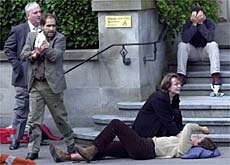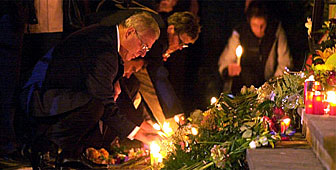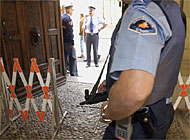Security worries persist as Zug marks anniversary of massacre

A year after a gunman stormed the local parliament in Zug, killing 14 politicians, the canton and the country are still grappling with the security issues.
A key problem has been balancing tighter security with civil rights.
On September 27, 2001 a lone gunman walked into the parliament in canton Zug and opened fire with a semi-automatic weapon. He killed 14 people – three members of the cantonal government and 11 lawmakers – before turning the gun on himself.
Inevitably, security was tightened at public buildings, and ministers were given better protection. But in the wake of the shooting, the country faced a dilemma: how to improve security without distancing politicians from their constituencies.
Possible strategies have been the creation of database of “troublemakers” with the aim of identifying potential killers and the appointment of ombudsmen.
Spur for action
An additional spur for action came when the police revealed that the number of attacks and threats against civil servants had doubled in the past five years.
The most frequently asked question after such a tragedy is whether it would have been possible to prevent the incident by identifying the attacker. Scientific studies have revealed, however, that it is nearly impossible to detect someone who is about to run amok.
Several cantons have introduced tougher safety measures and the security precautions in Zug itself have also been radically overhauled in the aftermath of last year’s attack.
And although parliamentary sessions are still being held in the cantonal police headquarters, the deserted parliament building has been prepared for the politicians to return after the autumn elections.
“Electronic key card systems have been introduced not only at the parliament but also at public administration buildings and justice courts,” cantonal administrator Gianni Bormio told swissinfo.
“We have also introduced a system whereby we can heighten the level of internal security, in the case of a high-profile court case for example,” Bormio added.
More threats
Barbara Umiker of the Federal Police Office thinks that people are more likely to make threats than 12 months ago. “There has been a general feeling that the public is more likely to make threats or launch attacks since last autumn,” she told swissinfo.
For this reason several cantonal police offices have employed specialists to deal with potentially dangerous people.
Another step to prevent such tragic incidents in future is a possible revision of the existing gun laws, which are among the most liberal in the world. The revision is currently pending.
The current law allows a majority of the population to be heavily armed as Switzerland’s militia system requires men above the age of 20 to be ready for a call to service. Soldiers also have the right to keep their rifles after they have been de-mobilised.
“Troublemakers”
Another strategy has been the creation of databases for “troublemakers” that should facilitate detecting potential attackers, however, such a source of information could undermine data protection.
“There is no doubt that we have to find new ways to prevent such attacks,” said Kosman Tsiraktsopulos, spokesman of the Federal Data Protection Office. “However, this doesn’t necessarily mean that we have to compromise our democratic society.”
Another plan is to appoint ombudsmen to help the public resolve their differences with the authorities. The Zug killer had been involved in a legal conflict with the local government before his attack.
Compared with other countries there are few ombudsmen in Switzerland; however, some authorities have already reacted to the massacre in Zug and have appointed ombudsmen.
“In Switzerland we are not used to the idea of government workers having bodyguards to accompany them home,” cantonal administrator Gianni Bormio told swissinfo.
“And we certainly don’t want to see things go that far. But clearly we have to ensure that there is adequate security in the workplace.”
There are currently six cantonal ombudsmen, who aim at settling differences between the public and the authorities, however, the cabinet does not see the necessity to create such a position on a national level.
Metal detectors
Security measures were also tightened at the federal parliament building in Bern after the events in Zug.
Additional guards, metal detectors and an x-ray machine were among the measures implemented shortly afterwards. All visitors to the building were scanned, as well as the parliamentarians and those who worked there.
The government’s ministers also received extra protection with their own bodyguards. Security has been toned down though in recent months. Only visitors are checked at the Parliament entrance now, and ministers only have bodyguards for major events.
swissinfo
On September 27 last year a lone gunman killed 14 people in the parliament in Zug.
Security has been tightened at public buildings and ministers have been given better protection.
A new action plan envisages the creation of databases of “troublemakers” and the appointment of ombudsmen.

In compliance with the JTI standards
More: SWI swissinfo.ch certified by the Journalism Trust Initiative


You can find an overview of ongoing debates with our journalists here. Please join us!
If you want to start a conversation about a topic raised in this article or want to report factual errors, email us at english@swissinfo.ch.